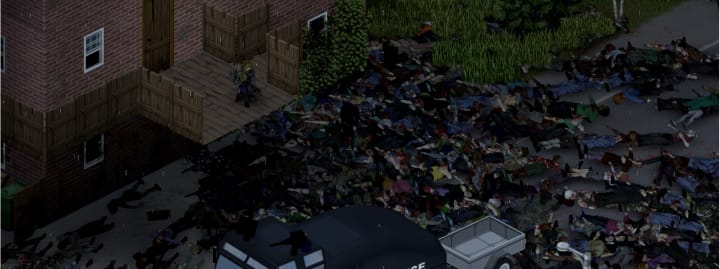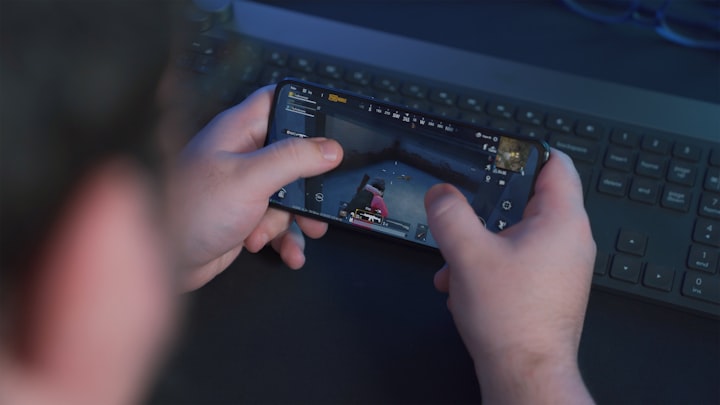
In an interview published on 28 May 2012, creator of the Day Z mod Dean Hall described his project as an 'anti-game.'
At times I’ve called it an anti-game because when I designed it I felt like I was breaking a lot of the things as a game designer you were told to you need to do. These were things like providing balance, for example, and I wanted to try something different
It's a quote that has stuck with me for quite some time. The fascination is two-fold.
On one hand, the term 'anti-game' invokes such mystique. It's an intriguing concept. If your game isn't, well, a game, what is it?
Secondly, it's the willingness to break conventional design decisions - such as, the game balance itself. Surely when a creator searches to subvert an aspect of art, they don't intend on dismantling the very mechanics the viewer uses to interface with it.
Day Z has been an inspirational game for me - a younger self would spend hours with the squad, scouring out that vaguely eastern-European setting, teaching ourselves Cyrillic for navigation and venting together when we inevitably, unfairly, succumbed to the many dangers the game presented.
Day Z went, with Minecraft, to inspire the relatively young but very much thriving survival subgenre, and if you've played Day Z recently, it feels a lot more like its contemporary cousins than the anti-game it started as.
The genre today has a decidedly arcade-y feel, with uniformed mechanics and homogenized design decisions. The core gameplay loop of all the game - explore, gather, craft, inevitably perish - is now refined, edges sanded back, surface polished clean.
It's now, widely, an enjoyable, fun experience. The days of having to learn another language for no application other than figuring out which town you were in are long gone.
That's not to say Day Z's legacy is surface level. The idea of the anti-game persists past it. Day Z proved to the world that a fun, satisfying experience isn't the only artistic expression a game can make, and in its wake, great things followed.
Day Z trended along with games like Dark Souls and Binding of Isaac, when the discourse in gaming at large was 'hard games are fun again!'
It inspired seemingly infinite imitators. Some more mechanically basic, like 7 Days to Die, and some ridiculously mechanically in-depth, like SCUM, where your metabolism is tracked and weight is gained in real time.
The core distinction here seems to be where the 'fun' comes in. Games like Day Z and more complicated variants like SCUM don't really deliver on the 'fun.' The combat is seldom satisfying and almost always unfair. Hours of play can lead to death by a fall you thought you could survive. Their experiences are solely one of tension, isolation, and desperation.
The more 'fun' counterparts - and the infinitely more successful - such as 7 Days to Die offer a wide range of mechanics that allow you to eventually overcome the survival mechanics and essentially 'win.'
The thing is - I don't necessarily want to win. Not when I'm playing these games for an experience other than fun. The overall experience Day Z expressed to me was not that I would eventually win if I was good enough, it was one of brutal tension, barely scraping by to get to my next can of beans.
It was, time and time again, vignettes of a depressing world, where humanity had lost and my time was limited. It was, almost always, a story of how I died.
This is How You Died

This is where we enter Project Zomboid. Project Zomboid has gained popularity recently, seemingly spawning its own meme culture out of nowhere.
The game is almost as old as the original Day Z mod is, and in many ways aimed to accomplish similar goals.
Brutal, uncompromising survival in a zombie apocalypse. Neither game would give any ground in the way of fidelity to popular zombie media, namely contemporary series like The Walking Dead or the 28 Days films.
Day Z, giving to the engine it was based on, leaned more into the aspect of human interaction. The zombies of Day Z were primitive, and the military-simulator-turned-zombie-game engine mod could only allow a limited number of new mechanics to be implemented.
So arose another popular aspect of Day Z - the ever-present other players, out for the same dwindling resources you are, just as vulnerable as you are, and potentially ready to fight.
Still, it left many disappointed as the zombies, as an enemy and a threat, were slowly looked over. While Day Z recreated the feel of a tense road stand off, many would have to look elsewhere for the other side of the zombie media coin - huddling in a darkened apartment, holding your breath as the innumerable hordes pass below.
This is where we enter Project Zomboid.

Project Zomboid was developed on its own engine, which in contrast to Day Z, meant that the entire experience could be tailored to be as realistic as possible.
In Day Z, you spawn on a beach, and run an inhuman amount of miles to subsist off whatever scraps you find.
In Project Zomboid, you'll most likely spawn in a house, with a meagre amount of supplies - perhaps a kitchen knife for a weapon - and instructions to barricade your home and stay still.
Realistically, if all the consequences of reality were considered, you'd probably do that. This being a game though, you swoop everything into your bag and run out -
- and zombies. Zombies, zombies, zombies. The Project Zomboid game engine, maintained over close to a decade now, has always been able to display a massive amount of zombies.
There's this problem with zombie games, where the zombies themselves are hardly ever a threat. They often cannot be rendered in such large numbers that their mere presence is a threat, and if they are, the player character is appropriately powerful to deal with the swarms.
Because running into a herd and immediately getting overpowered by the first line of the zombie army would not be fun.
Anyway, in Project Zomboid, you'll take your knife and try and kill a few of the zombies, and immediately get overpowered and die.
See, without tailoring your character for combat, your character will not be taking on many zombies at once. If you do spawn as a combat veteran, your other survival skills will be lower. Combat itself is a balancing act, and with a limited amount of attacks and a hidden dice-roll system factoring in a seemingly infinite amount of variables, you'll never be truly confident that you can take on the threat.
So whatever. Roll another character, and incorporate what you've learned. You'll spawn in a house again, loot up, this time sneak around the zombies, and check out the neighborhood house.
Ah - but the door is locked. That's okay, you're starting to get the 'point' of this game. You try a window - but that's locked too. Fine. Smash the window open. Can you do that? You sure can - it's almost like figuring your way around your first D&D game.
Anyway, woops. You set off a house alarm when you broke that window. It's loud and kind of annoying to listen to, and every zombie in earshot is on their way expressly to you.
Oh dear. You leap through the window to plan your next move and - well, you smashed the glass window open. There's shards everywhere. Your character gets a shard of glass lodged deep in their hand and trips over, cutting themselves on some more.
That's not great!
I could go on about the game mechanics further than that - our poor character would have to find a suture needle, or improvise one, to stitch up that deep wound, but not before pulling the shard out - with tweezers hopefully, if not, well, I hope you have painkillers. I think you get the idea.
This character though? Stuck in a house, ringing the dinner bell, messed up hand? That character isn't going to survive, and there's nothing you can do about it.
It Doesn't Get Easier, But It's Not Very Hard Either
So all these words and you're probably thinking - message received, it's a hard, brutal game. That's only half of the analysis, though.
The game itself isn't difficult or brutal, it's the experience it provides you. See, you will eventually master the mechanics. You'll figure out all the ins-and-outs of first aid, level up your shooting skill, figure out how the mindless shamblers work - you'll get so good your two-day average survival score will shoot up to months.

You'll hit a particular wall, though. You'll realize that the real 'fun' of the game, the action that provides the most consistent satisfaction, is when you're out in the world, surviving the moment-to-moment, searching for the next big loot cache - but that gets you killed. Constantly.
See, in Project Zomboid, if you break in to say, the backroom of a supermarket, you'll find a supermarket's load of food - comparatively. That is to say, one or two good looting runs can last your character for weeks, and once you have food and medical supplies - well, weren't you told to stay at home?
Should you put your character through that isolating experience of never leaving the house, rationing your food, and smartly avoiding encounters with the dead, you'll find you can survive...almost forever.
There's little danger if you hunker down in your starting home and play smart. There's almost no danger if you play it even smarter and leg it out of town, finding a distant farmhouse or campsite to live at.
Here, with the abundance of nature at your disposal, you'll never die. You'll fish, forage and grow your own food. You'll see one or two zombies in a blue moon, and your character will thrive.
It's just not very fun.
The only detriment to playing like this is a 'depression' status your character gains. It functionally does nothing - they haven't implemented a consequence for letting your character get horribly bored and depressed, only solutions, such as antidepressants and exercise.
Yet it is a little depressing, isn't it? Not for the character, but for you. You're watching what is by all accounts a miserable, unengaging life. You're separated from the experience by the screen of your monitor but you are bored, and if you truly tried to survive months this way, you'd be bored to tears.
In a way, that is a fascinating experience. Not so much in the sense it makes you bored while you play, but in what it pushes you to do.
Just like a depressed hermit in the apocalypse might take unnecessary risks for precious human contact, the player is going to start taking unnecessary risks when safety is assumed. They'll search for more food, guns to tame the herd, materials to repair their homes, and vehicles to block the roads.
None of it being truly necessary for survival. All of it, wonderfully complex and as deep as the ocean, but none of it necessary.
Stay home. Barricade your windows. Ration your food.
Do that, and you will survive. Help could be here any day.
Of course, help isn't coming. The game doesn't currently have NPCs, so you're not going to find a friend. This is, after all, the story of how you died. It was never anything else.
A Central Theme

Too often people associate the literary devices of literature and film as the strong points of a video game. Certainly, there is immense artistry in making a cinematic experience, or crafting a story so well-told that it brings you to tears.
It's not what games are good at, though. Games thrive the most, say the most, mean the most artistically, when they use their mechanics to express the human condition.
Not many games truthfully meet this mark. They are art, all the same, but they haven't maximized their potential. A small subset of games do even better than Zomboid does that conveying meaning through their mechanics - but these games are, almost always, constrained by budget and their initial scope.
Project Zomboid is special.
It is a masterfully crafted gameplay experience that, in many ways, achieves what its contemporary cousins set out to do, but several magnitudes better. It is also a brutal look into the true needs of humans, and how easily we can be compelled to act against our better judgement.
Project Zomboid challenges the player - 'come, conquer me. Learn my ways and master my mechanics.' Then, when the player does exactly that, it says - 'see? This world isn't fun. It isn't satisfying. It's not one you'd ever want to experience.'
Not many games are going to leave you as depressed as Zomboid is, while also beckoning you to come back and try again.
About the Creator
Jason
Copywriter by trade. Hobbyist creative writer. Weird lizard man. Analyzing a little bit of everything, with lots of rambling.






Comments
There are no comments for this story
Be the first to respond and start the conversation.